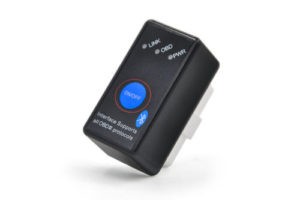Connecting your smartphone or tablet to your car’s onboard diagnostic system (OBD-II) opens a world of possibilities for monitoring performance, diagnosing issues, and even customizing settings. To bridge this gap, you’ll need a reliable OBD2 Bluetooth adapter. But with a plethora of options available, finding the Best Obd2 Bluetooth Adapters can be overwhelming. This guide will help you navigate the market and make an informed decision.
Understanding OBD2 Bluetooth Adapters
OBD2 Bluetooth adapters facilitate communication between your smart device and your car’s engine control unit (ECU). Choosing the right adapter is crucial for a stable connection and accurate data retrieval. There are several types of adapters based on connection type:
- WiFi: Connects wirelessly to your device via a WiFi network. While offering flexibility, WiFi adapters can sometimes experience connectivity issues and drain your device’s battery faster.
- Bluetooth (Classic): Uses Bluetooth versions 1.x, 2.x, or 3.x. generally favored for Android devices due to their faster data transfer speeds compared to Bluetooth LE.
- Bluetooth Low Energy (LE): Utilizes Bluetooth 4.0 and above, prioritizing low power consumption. Often preferred for iOS devices due to compatibility and ease of connection.
- Bluetooth MFi: Classic Bluetooth certified by Apple for use with iOS devices. These adapters are less common and usually more expensive due to licensing agreements.
- USB: Not typically supported by most OBD2 apps.
Choosing the Right Adapter for Your Operating System
iOS (iPhone/iPad): Car Scanner for iOS supports Bluetooth LE, Wi-Fi, and Bluetooth MFi adapters. Bluetooth LE is generally recommended for its ease of use and low power consumption. Bluetooth MFi offers top-tier performance but at a premium price.
Android: Android supports classic Bluetooth, Bluetooth LE, and Wi-Fi adapters. Classic Bluetooth is often the preferred choice for its speed and reliability on Android. However, simultaneous connections with other Bluetooth devices might cause interference on some Android devices.
Identifying High-Quality OBD2 Adapters
Adapter versions and chip specifications are often misleading. The key is to find an adapter that functions reliably without glitches or freezes. A “bad” adapter can manifest in various ways:
- Connectivity Issues: Frequent disconnections, unstable connections, or failure to connect altogether.
- Limited Functionality: Supporting only a subset of OBD2 commands or protocols, leading to incomplete data.
- Data Errors: Losing or distorting data packets, potentially causing misdiagnosis or even damage to the ECU.
- Compatibility Problems: Issues communicating with specific car makes or models.
Recommended OBD2 Bluetooth Adapters
Several reputable brands consistently deliver high-quality OBD2 adapters:
- OBDLink MX+: A premium option with Bluetooth MFi, offering top-notch performance for both iOS and Android.
- OBDLink CX: A reliable Bluetooth LE adapter suitable for iOS and Android, known for its large memory buffer and excellent performance.
- vLinker MC+, FS, MS: Solid options with various Bluetooth configurations (LE and MFi), providing good performance and firmware update capabilities.
- Vgate iCar Pro BLE: Compatible with all operating systems due to dual Bluetooth chips (2.0 and 4.0). Ensure firmware is updated for optimal performance, especially with CAN Extended addressing.
Adapters to Avoid
Certain brands and types of adapters are known for their poor performance and should be avoided:
- xTool: Incompatible with standard ELM327 software.
- Wired Adapters (USB, COM): Not supported by most wireless OBD2 apps.
- Adapters with “mini” in the Name: Often indicate low quality.
- Cheap Adapters (Under $10): Likely to have reliability and performance issues.
- Specific Brands: KONNWEI, Micro Mechanic, THINMI.COM, KUULAA.
Conclusion
Choosing the best OBD2 Bluetooth adapter requires careful consideration of your operating system, budget, and desired functionality. By understanding the different types of adapters and avoiding known problematic brands, you can ensure a seamless diagnostic experience. Invest in a quality adapter to unlock the full potential of your car’s data and empower yourself with valuable insights into its performance and health.

